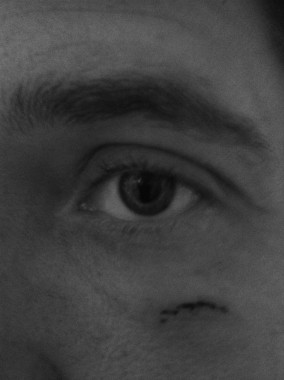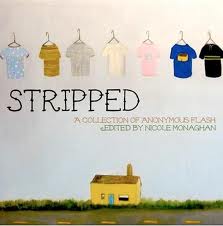Brown twitched his toes and saw the whiskey ripple. He snorted and scrubbed at his lips. Might as well be watching for catfish bubbles.
Tad Newsome told him he could get drunk soaking his feet in whiskey once. They were sitting outside the gas station and Tad was bored, Brown figured, so he concocted this big tale about dipping your feet and getting a good buzz going instead of drinking. He didn’t laugh when he said it, Tad, he just looked straight ahead with his crow feet eyes. Brown had kept from laughing then, though he wanted to badly.
It wasn’t funny at all now, with two weeks dry and four AA meetings that turned out to be nothing more than skinny boys trying to impress skinny girls with how bad they’d all been, oh so bad. It wasn’t right to judge these kids. Not Christian by a long stretch, but at this moment, humped up in the gone to heck cabin he built twenty-some years ago on the back side of John Attic Ridge with his feet wrinkling up in perfectly fine whiskey, he couldn’t focus on young folk trying to get dates.
Tuck Collins was still selling Brown’s nephew Dennie drugs. The whole thing was tangled up something fierce. All he was trying to do was send a message that’d stop was what happening to Dennie, the big mess he’d ran straight into headlong. He didn’t plan on shooting Tuck the day the troopers hauled him off on a firearm and terroristic threatening charge, just scare him. Now Tuck was full of juice for him. If he wanted Tuck dead, Tuck would be dead. He hadn’t even taken a shot, just held the old boy in place on the couch with that peashooter. When Tuck had picked up the phone and dialed for the cops, Brown let him, although grazing him across the shoulder had occurred to him, if he were to be discussing that day between just himself and the Maker.
A big fine mess, Brown thought, and pushed the washtub away from him. He took a hard look at the shifting whiskey, the way it glinted deeply golden in the half-light, and stepped from the cabin, his throat burning from memory and longing. Outside the cabin, he stretched and turned to his left. The ridge curled out in line with the smooth vanishing of the mountain, crested with poplars and the occasional small grove of pines. Squirrels jumped from tree to tree and stopping on a dime every time they landed. Brown couldn’t help but smile as two squirrels raced one another from a limb and crashed to the ground in a snap of brittle leaves. He squatted low and just as he had always done lay his hand out hoping one of them would cross by accident, imagining the scared creature resting for a moment in his palm.
Thinking of the squirrels and hearing the other wildlife around him, the flutter of brush across the mountainside and from a distant point in the neighboring valley a woodpecker hammering into the dried belly of a hollow tree, Brown rose to his feet, wanting badly to curse and wondering who was around to be offended if he did. Well, he knew. He was here and God was everywhere. His sister had said it so many times before leaving for Ohio.
It would be eight years this winter since Mary moved with Jim Chapman to Ohio, and he’d done as best as he could by Dennie in the meantime. Chapman came in talking Bible and Mary just went right away for him. Brown tried a few times to warn her off, but Mary only saw scripture and Jim Chapman’s easy brown eyes. That’s what she called them, easy brown. Dirty brown, more like it. He knew Jim Chapman, and Jim Chapman was no man of scripture.
“Dammit!” His voice rolled away from him in layers of echo and hectic reverberation. And though his heart was some lighter for it, his thoughts turned back to Chapman and Mary and Ohio.
Mary came to him with the news on a Tuesday. He was on his back in the field behind the apartment building they all shared breathing vodka fumes in his sleep and thinking on his time overseas. She said she was moving with Jim to Ohio where he had a job waiting. Brown remembered how her face was blurred and the sky behind her a gray smudge from his wavering vision. Mostly sleep, but a lot of drink, and he couldn’t make out a road sign from a moose. Ohio, he had said. Ohio, she answered. There was no mention of Dennie not going, and so he felt that loss wrap his heart like a hot rag. It wasn’t until Friday he found out Dennie had been left behind.
Now, surrounded by trees on the slant of the mountain, Brown thought of Dennie and how he might have been better off in Ohio with that weasel Chapman. They hadn’t heard from Mary in three months or more, but if things had went south, she would have phoned by now or just came home. Brown imagined her living a nice, Christian life, attending some dried up church where they probably didn’t even play guitar and piano, cutting the grass on land so flat it would make a man’s stomach turn.
Dennie insisted Ohio wasn’t all that flat, but Brown just told him he was missing the point. But never too harshly, never anything too harshly.
“It’s my fault,” Brown told the trees.
He moved along the ridgeline now, following the auger road cut out decades ago when coal was still being moved out and pipelines were being laid. The cabin sat in a slouch behind him, the waving whiskey light, and he was alone in the hills. He snapped a branch underfoot and listened for the squirrels to fetch away, expectant of hunters, no matter the season, probably most afraid of the Branham boys from Glich Creek come over the valley into Calvary. If they couldn’t find something to shoot, they’d roll down onto the horseshoe main stretch that ran through Calvary and see what was loose they could steal and take to Handy Creek Trade Center and sell.
As he came to a peak jutting out from the hillside large enough to sit and look down on the horseshoe of his town, he sat and pulled his knees up to his chest. These peaks and the ridges dotted around them were the strongest parts of the mountains, holding off from being beat away by weather and awful time because what they were made of was stronger than the sediment rock. They must have been made of iron to stand up against all that power, Brown figured. Sitting on his peak favorite now, seeing the town below just a tiny curve with the barber shop, the truck garage, the old high school the size of his fingernail, he felt so small.
When he couldn’t take feeling that small anymore, he climbed off the peak and found a water gap cutting a path of least resistance to make a baby valley inside this larger one and dipped his hands into the steady flow. He brought up two handfuls and gulped. Nothing. Tasteless. His body might appreciate it, but it was doing very little for his demon thirst. The cabin was a short walk back. He still had his legs, and the goshdang washtub was still flopped in the floor waiting.
Brown found a Styrofoam cup someone tossed out stuck on a tree branch while four-wheeling up to Yellow Flats probably and tucked it under his arm, careful not to pop a hole in it while he made his way back. Soon the cabin was in view. The sun hadn’t hit the cabin full on yet and the washtub would still be cool.
He pulled the door open and it popped loose at the top right corner. He nodded and shook his head. No concern either way. He gave the washtub a little nudge with his boot and the whiskey sloshed about. His knees popped loudly went he bent to dip the cup in, and, still bent over, he sniffed the brim, felt his throat tighten with anticipation, the back of his throat watering up already. A long drink and another and the cup was empty. The whiskey burned in that wonderful way and his stomach was buzzing warm in seconds. He dropped it like a penny into the tub, watched it spin for a bit and then come to port along the inner edge.
At some point, on some strange day, he or another of the crowd he ran with in the old days put up a mirror in the cabin. Probably it was Cash. Cash deejayed for 104.3 The Rock back in the seventies and was mostly concerned with his hair looking just right, long and divided into two ropes over his shoulders the way Willie Nelson looked but without the braids. Cash was in a band and said he needed the mirror in case he ever had to leave the cabin for a gig. His band never had a gig that Brown could remember.
But there, still, was the mirror. Splotches like mold or some grimy mess had collected from the corners toward the middle, but Brown was able to see enough of himself in it to feel a fair amount of disgust. No more than the usual amount. He scratched at his chin growth. Did a rat eat your razors? That’s what his daddy would say. He wished his chin jutted out more like Clint Eastwood or James Dean or whotheheckever. Instead, you could barely see his chin, it hid so far back against his neck.
He stretched out his neck so his nose nearly touched the mirror.
Mean eyes, though. Strong, don’t-mess-with-me eyes. The sort of color to them able to catch fire any second. The only thing that’d saved him more than once standing off with all sorts of no-counts was staring a guy down. When it didn’t work, he had to hurt them. Sometimes they got him pretty decent.
He turned his head. Half a lobe missing from the right ear. A rough night, that one. Guy from Williamson took offense to something Brown said and charged him. Didn’t take a swing or throw up a knee or nothing. Just went straight for his ear with these hog-square front teeth of his. And then this Williamson boy took off running. Brown stayed behind until the cops showed, looking around the place for bitten off part of lobe like it would matter if he found it.
He smiled into the mirror. Rough night, that night. The Styrofoam cup was floating in the tub of whiskey, setting sail again. Brown pushed it down and let it fill up then eased it up to his chest, switching the cup to his left hand so he could wipe dry his other on his pants. Two gulps in, he heard the cabin door splinter-pop and watched it come slowly open.
“Hey, Brown Bottle,” Tuck said.
Tuck looked even smaller in the doorway with a line of big oaks framed up behind him. He’d lost twenty pounds at least in the last year, about the same length of time since he’d had a haircut. Brown saw a good full growth of beard, thickest at the no-count’s jawline.
“Rat eat your razors?” Brown asked, and sat back in one of the cabin’s three chairs. He finished off the cup of whiskey. “I’ll offer you a drink after we take care of this. Should be a straw or two somewhere around here. You might be able to get a sip or two through.”
He about felt bad for Tuck Collins right then. Small and frail, even if it was from his own doing. Nothing but a snack of a standoff with him that puny and it that condition.
Tuck didn’t offer to walk into the cabin. He took a step back and held out his arms in the way a man will when he’s trying to show he means no harm. Flannel drooped off his wrists and elbows, the bend at his armpit. A bored scarecrow stuck in the middle of the woods. But his face was all harm, as much of it as man could ever want.
“I’ve got boys up here with me,” he said. “Outnumbered mean anything to you, you drunk?”
Brown was up fast and closing the distance between the two of them.
“They’ll shoot you, Brown. If I lower my arms to my sides, soon as they see you they’ll shoot you. And then you know what? We’ll take you up to Spider Town and haul you back in an abandoned mine.”
His mother, Heaven accept her, didn’t raise no fool. Brown allowed his retreat to be a slow turn back to the washtub to dip the cup again. He landed roughly back into the chair, hating that he wobbled and showed he was feeling a buzz.
“Go on ahead and say or do whatever you figured on saying or doing when you hiked your lazy butt up here then,” Brown said. “If you, in fact, got boys out there with some old creaky rifles or shaky little handguns and so high from your pills they couldn’t hit a bull in the butt with a bass fiddle, then let me ask you something, Tuck.”
Tuck stood with arms still out, Christ-like, satisfied with himself, the power of the moment.
“You think that’s something new to me?” Brown continued. “Try laying snake-belly on flat land and knowing they’s well-kept machine guns twenty feet from you and men holding them so focused you’d think the Lord himself was putting a bead on you for them.”
For less than a second, Tuck’s easy grin went flat, and then returned.
There hadn’t been a single bird take flight, not one of his squirrels from earlier move off in another direction. There had not been a sound from outside the cabin except Tuck’s yapping. Brown figured he was bluffing, but it wasn’t worth it.
“This whole thing has to do with Dennie,” Brown said. He could feel the whiskey in his words. He kept back anything else he might say. He would allow Tuck to either kill him, which was unlikely, or talk himself down and leave.
Tuck stood in the doorway a few beats more and then stepped inside the cabin. Not a muscle on Brown’s body moved. He was ready, either way. But it would have to be Tuck who would take him down. He knew that wasn’t going to happen. And so did Tuck.
“You ain’t scared of dying?” Tuck said.
Brown sat in his chair. He shuffled his feet, doing a little dance on the rotted boards, smiling.
“Talking too much,” Brown said. “Got a gun on you? Pull it out, aim it at me, and shoot. Do that, or get out. Do it now, or get out.”
Tuck lowered his arms. Brown could almost see embarrassment across his face, like the underbelly of a fish, white and vulnerable. When Tuck turned to leave, Brown pulled a .360 from his ankle holster and winged Tuck in the shoulder.
“On second thought,” Brown said, and listened to the wildlife finally scattering out through the hills.
He’d had a buddy shot once in the middle of a field overseas. They’d all spread out and was combing around like they always did, watching for some Cong or another to appear out of thin air. And his buddy was in the middle of this field and a shot came and took him down. Some dang good sniper put it perfect through his upper leg. Brown and the rest figured the sniper might’ve missed his mark. A rare thing, but no matter. They had a man down in the middle of that field and they went to him. Turned out his buddy, Heaven help him he couldn’t remember his name, wasn’t nothing but a honeypot they called it. That devil of a sniper put one through his leg knowing they’d come out for him like dumb as heck worker bees. Five men took shots through the head and dropped like blankets off a clothesline before they got cover.
With Tuck tied to the tree beside him and bleeding and looking pitiful again, Brown thought of telling him about that day in the field, give him an idea of what could be done, how he could draw his doped up boys right into range. But it was something he’d have to give deep consideration.
“I’ll be back directly,” Brown said. He stood and walked the twenty feet back to the cabin and scooped another cup of whiskey. Tuck yelled after him for a while, then went quiet. Brown took his rifle and scope and eased out to a good flat spot on the auger road and lay down to think. He thought of Dennie. He thought of how Tuck and his boys were just like it was overseas, one big endless stream of folks coming from every direction at all hours. He thought of Ohio or Indiana or Michigan. Then he sat up and sited his rifle, eased his breathing, and for the first time in a long time thought of some kind of future.
 Sheldon Lee Compton is the author of The Same Terrible Storm. He survives in Eastern Kentucky.
Sheldon Lee Compton is the author of The Same Terrible Storm. He survives in Eastern Kentucky.



 Stripped: A Collection of Anonymous Flash
Stripped: A Collection of Anonymous Flash